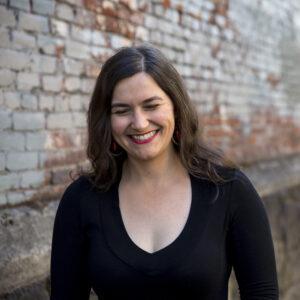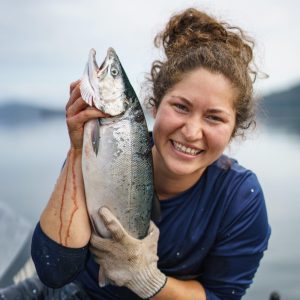
Senior Communications Manager
As remote communities in Southeast Alaska contend with COVID-19, our team worked with partners to keep safety top of mind in planning the summer field season.
Typically, the summer season in Alaska is a time for subsistence foraging, fishing, and hunting for both Native Alaskan people and full-time residents. In addition, summer is the primary income-generating season, as Alaskans anticipate the flood of millions of visitors and gear up for other seasonal work. This summer was to mark the second season for the Keex’ Kwaan Community Forest Partnership (KKCFP) field crew to continue their work conducting a 165,000-acre watershed assessment. However, with community safety a top priority amid the COVID-19 pandemic, plans for the current season needed to be restructured to meet requirements for physical distancing while supporting the community and continuing to move the work forward.
Ecotruster and KKCFP Coordinator Miakah Nix (Haida, Tsimshian) and Knowledge Systems Program Director Jon Bonkoski took time in the midst of kicking off this summer’s work to share an update.
Miakah: We have another year’s worth of work adding to the inventory and the assessment of the project area, a 165,000-acre landscape. The idea was that we would get as close to completing the inventory as possible and then move forward with using the data to tell a story and work with the community to outline priority needs and restoration goals. The project design and pilot restoration activities were planned for 2021.
We were going to run a six-person crew for this work, and now we’re hiring a two-person crew—both of our crew leads from last year. This will help us keep project momentum, and retain more our skilled and experienced crew members for the long-run.
Four out of five of the 2019 crew reapplied, and then we had an additional five new applicants from the community. It’s a big deal that we were not able to hire more crew members.
It is important to all of our partners and the steering committee that we create jobs and bring income to the community. We’re working with OVK’s (Organized Village of Kake) help to make sure that this project can add as much value as possible, even if it means helping people access unemployment. Unemployment rate hovers around 80% under normal circumstances. Making sure there’s some income coming into the community is central to how we’ve been moving forward with the process.

A KKCFP crew member holds a tablet opened to a mapping app.
Jon: I think it’s really strengthened the network, actually. So much of our work had already been done in a distributed, remote network model, relying heavily on Zoom and video calls.
The leadership from the network director, from Paul [Hackenmueller], from other people up in the steering committee has been really fantastic.
“
We still can accomplish good, thoughtful approaches to land conservation, to land use, to resource management, all of those things. The need is still there.”
—Jon Bonkoski
Miakah: For years, SSP has been hosting monthly hangouts for the network to get together and brainstorm, collaborate, and share updates. So in many ways we didn’t really see a shift for the virtual platforms. It was kind of business as usual, which was really good for the anxiety that people were feeling—to have a sense of normalcy.
On top of that, I saw deeper collaboration. Keeping community safety in mind, knowing that regardless of how we move forward, we have to mitigate our risk to these communities that have such limited services. I saw core members from the network reaching out to local landowners and stakeholders, federal agencies, and actually spending the time together to make these hard decisions in ways I didn’t really see before. In a way, [the pandemic] gave people time to spend together to make real decisions.
Miakah: This year, we were going to have been working on new field protocols. Because we can’t train on those new protocols, we are limited in what [data] we’re able to collect this summer.
Jon: The technical training leads on the team have pretty much committed to staying away from Kake in order to help protect our partners there and protect the community.
But because we’ve relied on a remote, technology-based platform already, we knew we would be able to conduct effective training for the field crew. It’s been pretty cool to see that come together.
This sort of reduced footprint still has a cost to it. People have to go out; they have to use field equipment. They have to now do it in a socially distanced format, like taking more than one vehicle for two people.
There are ways to piece it together and manage through this crisis. Also, you can’t get away from the invaluable aspects of Miakah being on the ground and helping coordinate and being this catalyst, being this person who a lot of this stuff gets pushed through.

Miakah Nix works with other community members in the Organized Village of Kake to create shared garden space.
Miakah: If Kake follows suit with lessening the local restrictions, it is likely we could hire two more full time crew members to do a portion of the field work. There’s actually the chance that our past crew members or other new applicants would get a chance to work on the project this year.
Jon: Our work now is maybe a little more challenging, but it’s not gone away. We already had the pieces in place and were able to put together a plan. Even though it’s reduced due to a global pandemic, we’re still able to accomplish some work. Life will continue, and that’s a lesson that’s been emerging slowly for people, for me. We are able to do things; it’s just going to be different, and the way we approach them will be different. We still can accomplish good, thoughtful approaches to land conservation, to land use, to resource management, all of those things. The need is still there.

“
It’s exciting to find a way to run a small crew, keep the project going, continue to build relationships, and harvest and process and grow food, and help the community that I love being in.”
— Miakah Nix
Miakah: The thing that really struck me is I was really impressed by how our steering committee and other leading partners really were aligned in leaving the final decision to local community leaders. Although we couldn’t put a poll out to the community, our steering committee kept the community in mind. We call it a Community Forest Partnership. We work hard to keep the focus on the community, but we are still learning how to really put the project in the community’s hands. In that moment with the steering committee, when we were trying to decide how this field season or the future of the project was going to come down the funnel, they said, “If at any level you get a red light, then we’ll postpone until 2021.”
I’ve also been taking the lead on a couple of cooperative gardening efforts in Kake. Especially at the height of panic around the pandemic, the food supply chain to Kake was really heavily impacted. Many items weren’t being stocked in the stores, which is hard because this is about the time of year when people’s freezers start to empty out. One of the main responses from OVK and the community was everybody got really motivated to garden. The Tribe decided to build a garden to start offsetting some of the needs to the commodities programs and the church food programs that help supply families in need, as well as to inspire people to garden at home.
I think it was my godsend to take over on the food security work and the garden. It meant a lot for my mental health to have something concrete to work on that felt valuable. Local food is my passion, so it’s pretty exciting to have been able to find a way to run a small crew, keep the project going, continue to build relationships, and harvest and process and grow food, and help the community that I love being in.
A lot of what we’re doing is trying to focus on continuing to build trust and strengthening those relationships and the engagement in the project. Seeing how we’ve adapted to keep community safety, health, and food security in mind is continuing to broaden those relationships and that trust. Choosing the safer option and supporting this community gardening effort both really demonstrate the project’s, Ecotrust’s, and my own investment in the community, their health and safety.